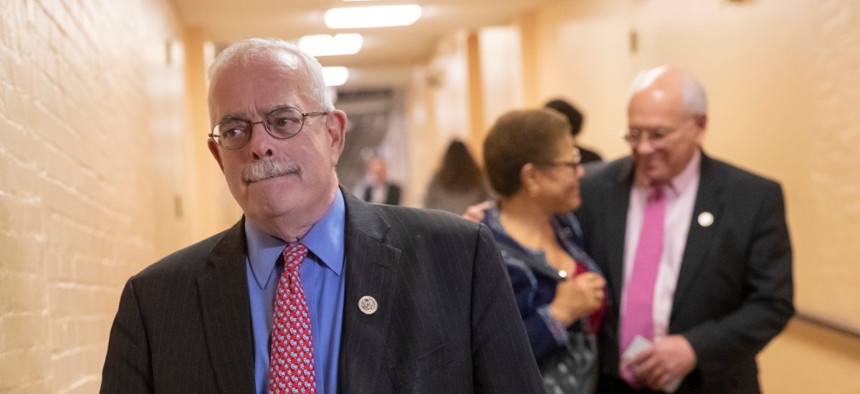High-Level Vacancies Are Weakening Agency Management and Oversight, Lawmaker Says

Rep. Gerry Connolly J. Scott Applewhite/Shutterstock.com
Rep. Gerry Connolly’s comments marked the release of a bipartisan report recommending ways agencies can deliver better on their missions.
The unprecedented number of vacancies and positions filled by acting officials in the Trump administration is significantly hurting agencies’ capacity to fulfill their missions, said Rep. Gerry Connolly, D-Va., chairman of the government operations panel on the House Government Oversight and Reform Committee on Tuesday. “I think it weakens government. I think it is not a good management model,” he said.
Connolly made the remarks at an event by the Bipartisan Policy Center to release a new report: “Oversight Matters: Balancing Mission, Risk and Compliance,” that aims to improve how agencies oversee their own operations. “Everything we're talking about in your report is damaged, frankly, by the proliferation of acting [officials]," he said. With so many acting and vacant positions, “It kind of fuzzifies the lines of responsibility to the public and to Congress.”
A recent report by Axios found that the Trump administration has “racked up more than four times as many days with a vacant Cabinet position as any other president since Ronald Reagan at this point in their presidencies.”
The Bipartisan Policy Center’s report, which was written by a bipartisan group of former government officials, recommends, among other things, that agencies focus more on mission performance than on compliance with management and reporting requirements.
Although Connolly agreed with a majority of the report’s findings, he disagreed with the compliance aspect, which led to a debate about the merits of mission performance versus compliance.
The authors recommended that executive branch oversight bodies prioritize mission outcomes and policy goals over compliance. “Agency program managers bear the brunt of the compliance burden,” the report says. The task force suggests a re-balancing of practices as well as cost/benefit analysis to determine the effectiveness of compliance practices.
Connolly took issue with that recommendation: “There is value in compliance. If we put this in perspective, the report creates a kind of zero sum balance I think between compliance and performance.” He cited key laws and regulations that have improved government operations by requiring agencies to comply with meaningful standards: the Federal Register Act, Privacy Act, Inspector General Act, Data Quality Act, Paperwork Reduction Act, Federal Information Technology Acquisition Reform Act and Foundation for Evidence Based Policy Making Act.
Compliance with Congressional mandates is central to governance, Connolly said, noting the actions the House may take in response to Attorney General William Barr and Commerce Department Secretary Wilbur Ross defying congressional subpoenas: “I believe that this compliance process will help illuminate for the public what transpired and why” the Trump administration wanted to add the citizenship question to the 2020 census.
Several of the panelists pushed back on Connolly’s remarks.
Robert Shea, task force member, principal at Grant Thorton and former executive at the Office of Management and Budget, said, "One of the things I think Congressman Connolly misses is the extent to which we drive organizations to focus too much on compliance and not enough on outcomes."
“Compliance is more than just checking off a box,” said Dan Blair, senior counselor at the Bipartisan Policy Center and a task force consultant. He cited numerous high-profile incidents that compliance practices didn’t prevent. Those included the 2015 Office of Personnel Management data breach that compromised the personal information of more than 20 million federal employees, retirees and their family members; whistleblower Edward Snowden’s leak in 2013 of classified government information on surveillance programs; whistleblower and former Army private Chelsea Manning’s disclosure in 2010 of nearly 750,000 classified and sensitive government documents to Wikileaks; and the 2012 Government Services Administration scandal that resulted from the agency’s inspector general report that outlined lavish and wasteful spending.
"I really appreciate Congressman Connolly's pushback on the report because if we were all singing kumbaya and thought everything was wonderful and perfect then I don't think we were doing our jobs," he said.
NEXT STORY: FCW Insider: July 17






